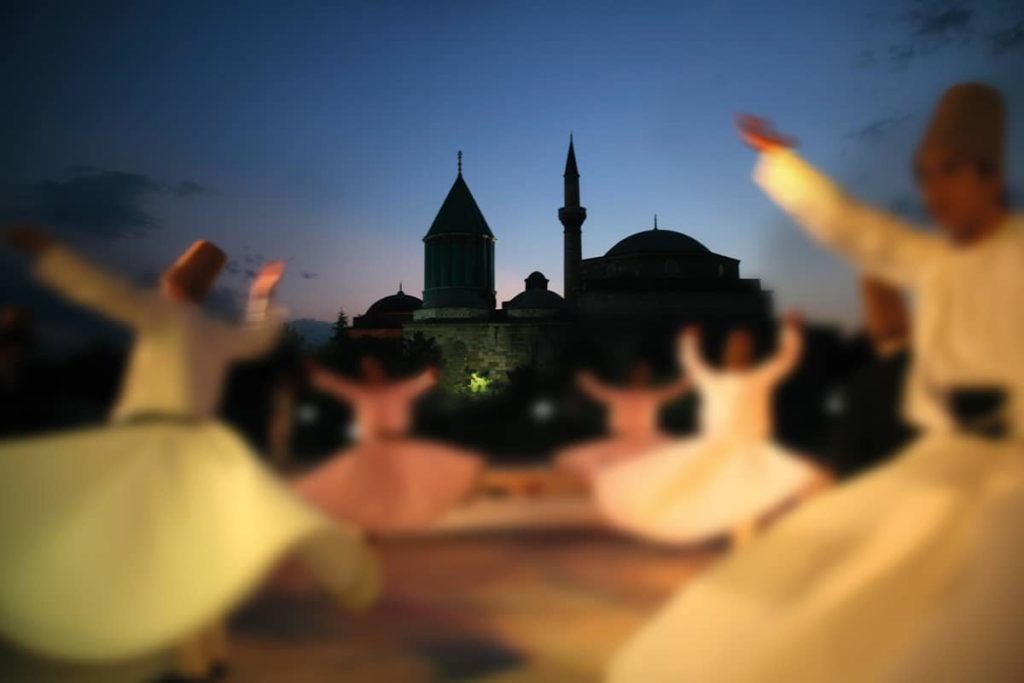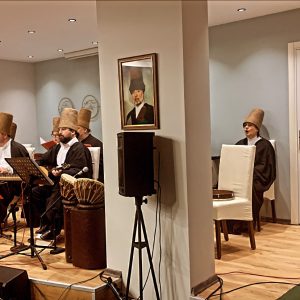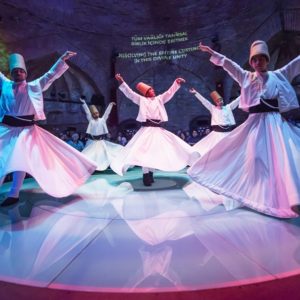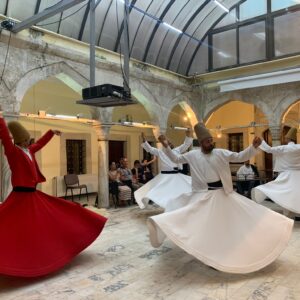Hz. Mevlana Celaleddin-i Rumi is the great Anatolian mystic, poet and the father of the Mevlevi Order. He is known as Hz. Mevlana in the East and as Rumi in the West. At birth, his family named him Muhammed, though he came to be nicknamed Celaleddin. As for “Mevlana”, it connotes to “our master”, while “Rumi” relates to “the land of Rum” or “Anatolia”, where he lived. In his lifetime, he was also referred to as “Hudavendigar”, meaning “distinguished leader”, whereas his present internationally renowned title “Mevlana” was very seldom used. The name “Rumi” was added to the end, rather later on.
Hz. Mevlana was born on 30 September 1207 in the city of Balkh, Horasan, which at the time was inhabited by Turkish tribes; (Balkh, today, remains within the boundaries of Afghanistan). His mother Mümine was the daughter of Rükneddin, the “emir” (sovereign ruler) of Balkh and his father, Bahaeddin Veled, was “Sultanu-l ulema”(chief scholar). Their clash of opinion with Fahreddin-i Razi, one of his contemporary mystics, along with the probability of a Mongol invasion urged him to desert his hometown accompanied by his entire family. Their migration, via Baghdad, Mecca, Medina, Damascus, Malatya, Erzincan, and Karaman, ended up, on 3 May 1228, in Konya upon the invitation of Alaeddin Keykubad, the Seljuk Emperor.
Following his marriage to Gevher Banu in Karaman, Konya, Hz. Mevlana had two sons whom he named Bahaeddin (Sultan Veled) and Alaeddin. Years later, during his time in Konya, and after Gevher Banu passed away, Mevlana married Kerra Hatun by whom he had two more children; another son, Muzafferreddin Emir Alim and a daughter Melike.
As Mevlana begins attending his father’s lessons at a very early age, he pursues the divine truth and secrets. He acquires Turkish, Arabic, Persian, and common Greek as well as Classical Greek. He studies the other religions along with Islam. From history to medicine, he receives his initial education from his father and then from Seyyid Burhaneddin Tirmizi and other top scholars of the time. Later on he himself, in turn, teaches hundreds of students in Madrassahs (theological universities).
Meanwhile, Sems-i Tebrizi, not fulfilled by the ultimate spiritual rank he has attained, is in search of another fellow acquaintance to match his own scholarly wisdom and to enjoy his company. Sems and Hz. Mevlana, who had their first encounter in Damascus, meet again in 1244, in Konya. These two God loving velis (guardians), focus intensely on divine discussions and together they attain heavenly wisdom. With most of his time spent in endless talks, poetry recitals, and whirling rituals with his spiritual soul mate, jealousy becomes aroused among Mevlana’s students. Unjust rumours are spread against Sems-i Tebrizi, who is offended and flees Konya for Damascus. Hz. Mevlana, in his deep grief, secludes himself from all friends and writes many of his verses which we read in Divan-i Kebir. The instigators of this unfavorable situation express remorse and a group led by Mevlana’s son Sultan Veled goes to Damascus and brings back Sems-i Tebrizi. Nevertheless, jealousy arises once again and Sems, this time, suddenly disappears altogether. Even though his tomb is assumed to be in Konya, whether he deserted the city or was murdered still remains a mystery.
Hz. Mevlana enters a new stage in his life upon the disappearance of his close friend. He first appoints Sheikh Selahaddin-i Zerkub, who passes away, then he appoints Chalabi Hüsameddin, one of his own students, to teach on his behalf.
As long as I live, I am the slave of the Quran I am the ground of chosen Mohammed’s way…
Whoever carries a word of me apart from this I am complainant of him and I am complainant of those words too.
As can clearly be inferred from his words above, he always pursued Hz. Mohammad’s teachings in his divine journey, always conforming to God’s commandments, preaching and practising in the Islamic discipline. He always complains about the fundamentalist ideas appended into Islam later on, and even more so about the destructive ignorance of the madrassah. Read his reed on the right, how it complains: it is telling a tale of separations
Istanbul, Konya, Cappodocia, Turkey sufi and Whirling Dervish shows, tickets, ceremonies.




